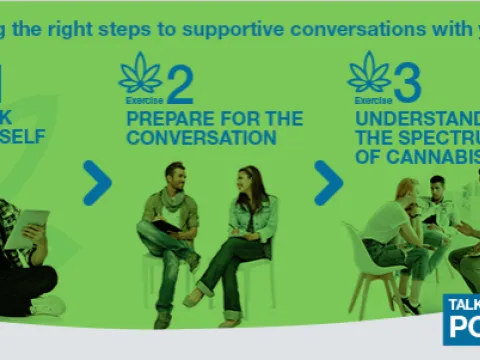How does cannabis affect the health of youth?
We need more research to better understand how cannabis affects the health of children and youth. Below is some information about the use of cannabis and its effects on physical and mental health.
Medical use of cannabis
Research has shown that for specific people, the CBD in cannabis can help relieve the pain, nausea and muscle problems that are a part of serious medical conditions. Cannabis can also improve the appetite of those with weight loss from HIV/AIDS or cancer treatment. It may also provide relief from anxiety, insomnia and depression for those struggling with chronic illness. Cannabis is not recommended for any mental or physical health conditions in children and youth except in very rare medical circumstances. Talk to your doctor if you have questions about the medical use of cannabis.
Non-medical use of cannabis
Many people who use cannabis socially say it helps them relax and increases their sense of well-being. However, some people feel anxious after using cannabis, which can cause them to withdraw from others. They may also have a hard time remembering things for several hours. In a small number of youth, cannabis use has also been linked to suicidal thoughts.
When a young person uses a lot of cannabis everyday, it can negatively affect their quality of life, IQ level, motivation, attention, concentration and life satisfaction. It can also affect learning, problem-solving, and decision-making. A young person’s brain grows and develops well into their mid-20’s. This is why delaying cannabis use for as long as possible during brain development can decrease the risk of poor health outcomes.
Cannabis smoke contains toxins, so over time, heavy use of cannabis can increase the risk of breathing problems such as coughing and shortness of breath. Cannabis, especially the kinds high in THC, has been linked to psychotic symptoms or psychosis in a small number of people. They may experience thoughts, feelings, sounds or see things (hallucinations), that others around them do not experience. For most people, the symptoms go away and do not return unless cannabis is used again.
A small number of people may develop longer lasting psychosis. This usually happens only to those with a personal or family history of serious and persistent mental illness such as psychosis or substance use problems. The younger that someone starts using cannabis and the amount and length of time they use can contribute to a set of life conditions that, for this very small group, results in a diagnosis of schizophrenia.
When is using cannabis a problem?
Using cannabis is a problem when it negatively affects the life of your child or the lives of others. Most people do not experience long-term effects from experimenting with or using substances. It is important to remember that the level of risk related to cannabis use differs from person to person, from use to use, and depends on much more than the properties of the drug itself.
These factors include:
- starting to use at an early age (young brains are still developing and are more vulnerable to the effects of psychoactive substances)
- how often it is used
- how much it is used and the THC content
- the method of use (for example: smoking, vaping or ingesting impact the body differently)
- how and from where the drug is obtained
- their personal health history
- when and why they use the drug
- what they're doing when they use (for example: driving, using other drugs, sexual encounters)
There is no universally accepted “safe” level of cannabis use, but the factors above can affect the risk for a person using cannabis.
A young person may think it is fun to use cannabis every day or smoke a lot of cannabis at a party. But this can result in less contact with others, ignoring responsibilities, giving up previously enjoyable activities, increased poor decision making or have other negative health effects. Visit Foundry’s website for more information on the health effects of cannabis.
Cannabis may help ease anxiety or stress if it is only used once in a while. But, like alcohol, if it is used more regularly, or the amount of cannabis being used increases, the chance of harm increases.
Frequent or intense cannabis use can also lead to a young person’s body becoming dependent on cannabis or needing increased amounts to achieve the same effects. If your child is noticing challenges such as cravings, difficulties with cutting down or controlling the amount of cannabis use, speak with a health professional.




